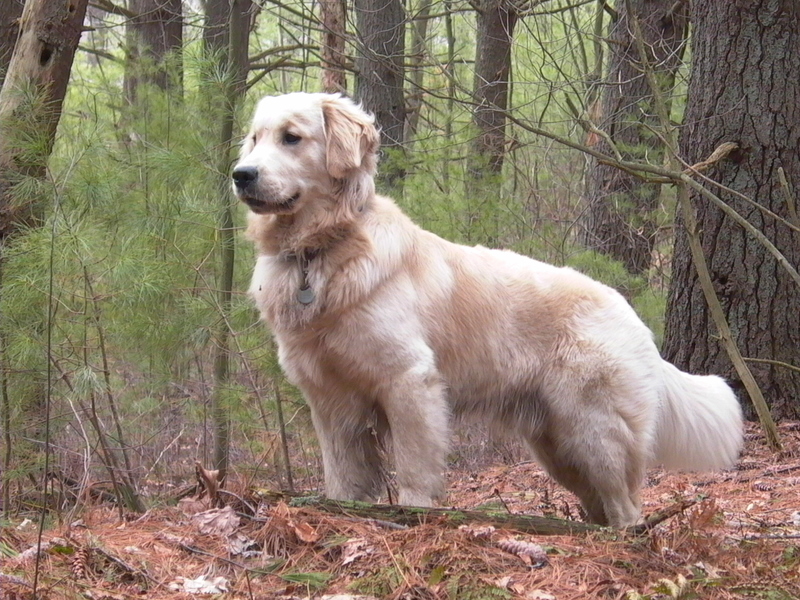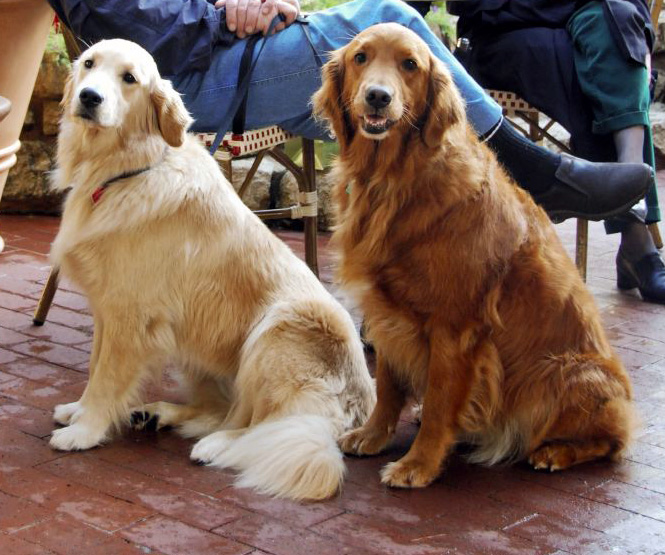Golden Retriever


[1]The Golden Retriever is a breed of dog, specifically a sporting breed. The history of the Golden Retriever is long and vast. With its easy to please attitude and its superior intelligence to other breeds; it is the most popular breed in United States according to [2]AKC Registration Statistics. It is the second most popular dog in the United States. The number one breed is the Labrador Retriever. Also, the Golden Retriever, being a useful hunting companion, also makes the breed ideal for guide, assistance, and search and rescue. First classified as the Retriever (Golden and Yellow) in 1920, the name was changed to Golden Retriever. Since that year the breed has continued to grow in popularity around the world.
History
editThe Golden Retriever was first developed in the British Isles circa 1860. [3] A man named Sir Dudley Majoribanks (aka Lord Tweedmouth), is credited with the eventual breeding of the very first Golden Retriever. Tweedmouth wished to develop a dog which was loyal, kind, spirited, and energetic. He also sought characteristics such as love for the water and ability to retrieve, specifically waterfowl. It is said that the Golden Retriever is a cross between a yellow Flat-Coated Retriever, light-coated Tweed Water Spaniels (and other spaniels), a Newfoundland, and possibly even a Bloodhound. The breed was first shown as a Golden Flat-Coat. Once the Golden Retriever received recognition, it over time made its way to North America (brought back by people visiting Britain). The breed was first exhibited in Britain in 1908 by Lord Harcourt in a Kennel Club show. Though Lord Harcourt had named it the Golden Retriever, the Kennel Club registered it as the “golden variety of the Flat Coat Retriever.” It was then granted separate breed status in 1913 and recognized by the American Kennel Club in 1925. [4]Golden’s were not exhibited in dog shows in the U.S. until the 1920’s. The greatest enthusiast of the breed was Mrs. Charlesworth, who made sure that the golden retriever was maintained as a dual purpose dog – a hunting dog that was a wonderful family companion. She also pioneered the opening of The Golden Retriever Club with her fellow enthusiasts in 1911. [5]It was because of her efforts that the Kennel Club registered it as a distinct breed in 1913.
Health
editA Golden Retriever’s life expectancy is about 10-12 years. Hip Dysplasia [6] Prone to hip dysplasia, Golden Retriever certifications are important. The term hip dysplasia means poor formation of the hip joint, and describes a developmental disease in young dogs of many different breeds. Unsound hip joints are a common problem in larger breeds, and hip dysplasia can be a serious problem in any dog that is to be trained for a demanding activity. Congenital Eye Defects Hereditary cataracts are a common eye problem in Golden Retrievers. ( Cataract is defined as any opacity within the lens of the eye.) At least one type of hereditary cataract appears at an early age in affected Goldens, and while these may or may not interfere with the dog's vision, some do progress into severe or total loss of vision. There are also non-hereditary cataracts which sometimes occur, and examination by a board-certified veterinary ophthalmologist is necessary to determine if the cataract is or is not of concern from a genetic standpoint. If there is any question, the dog is certainly not to be recommended for breeding. Elbow Dysplasia Like hip dysplasia, elbow dysplasia (ED) is a developmental disease of young dogs, although symptoms can appear at any age. While not as common as hip dysplasia, ED is estimated to affect approximately 1 in 10 Golden Retrievers. Also like hip dysplasia, many affected dogs have no symptoms at all, yet can pass more serious disease on to their offspring. For other affected dogs, symptoms range from mild stiffness and discomfort, to crippling disease. Heart Problems Golden Retrievers often have heart problems. Hereditary heart diseases, most commonly Subvalvular Aortic Stenosis (SAS), is known to occur in the Golden Retriever breed. All prospective breeding animals should be examined by a board certified veterinary cardiologist. If a murmur is detected through auscultation (listening with a stethoscope), additional diagnostic tests are available and may be recommended. However, even if the results are negative, this does not rule out heart disease, as some mild but hereditary forms may be undetectable except on necropsy. Animals with hereditary heart disease should not be used for breeding. Skin Allergies Skin allergies are common in Golden Retrievers and require immediate veterinary attention.
Appearance
edit[7]The Golden Retriever commonly is beautiful, sturdy, and well proportioned. It is of medium length with a cream to golden coat. The golden-colored coat is the hallmark of this versatile breed, and can range from light to dark gold. The outer coat however is water repellent and the undercoat is dense. The head is broad, with a tapering, but wide, powerful nuzzle. It has a scissor bite and a clear frontal stop. The nose is black and the kindly eyes are brown with dark rims. The ears are medium-sized and pendant. Its neck and thighs are muscular and the chest is broad. The tail is long, but never curled.
Temperament
editThe Golden is one of the world's foremost family companion dogs. Many of the top obedience competition dogs in the country are Golden retrievers. The Golden is also a fine bird dog on both land and in the water. He has an excellent nose and has been used not only for hunting and tracking, but also for narcotics detection. Because of his great desire to please and capacity for love and learning, the Golden Retriever is also used as a guide for the blind, therapy dog, and service dog for the disabled. Mild mannered and extremely trainable, the Golden has excelled in obedience and has an outstanding record as a guide dog for the blind. It is reported that at the guide dog training schools there are fewer rejects among Golden Retrievers than there are for any other breed.
Notes
edit- ^ What is a Golden Retriever? Retrieved March 18, 2009 from http://www.topgoldenretrieversites.net/blog/johnwa0698.shtml
- ^ AKC Meet the Breeds: Golden Retriever. Retrieved March 18, 2009 from http://www.akc.org/breeds/golden_retriever/index.cfm
- ^ The History of the Golden Retriever. Retrieved march 18, 2009 from http://www.rebelcreek.com/GoldenRetrieverHistory.html
- ^ Golden Retriever History. Retrieved March 19,2009 from http://www.breederretriever.com/dog-breed-history/149/golden-retriever.php
- ^ Golden Retriever History. Retrieved March 18, 2009
- ^ Golden Retriever Club of America. "Health Concerns." Retrieved March 18, 2009 from http://www.grca.org/health/health-concerns.html
- ^ Dog Breed Info Center. Retrieved March 18,2009 from http://www.dogbreedinfo.com/goldenretriever.htm